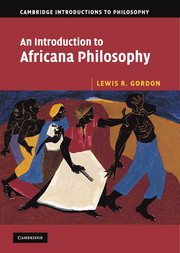2 - Classic eighteenth- and nineteenth-century foundations
Published online by Cambridge University Press: 05 June 2012
Summary
The question of slavery has been a constant concern of modern European thought. John Locke found it necessary to offer rationalizations for it in his Second Treatise on Government, and constant references to themselves as “slaves” struggling for their freedom occur even in the arguments used by the Founding Fathers of the American Revolution. In philosophies of the modern era, then, we find the contradictory situation of arguments being offered against slavery by those who also depended on and offered arguments for the enslavement of others. This required great acts of self-deception and misrepresentation of history. Locke, for instance, argued that the procurement of slaves was permissible from a just war of self-defense against someone or some group who had violated a law of nature (for example, waging war against a fellow human being). In effect, his enslavement and the taking of his property (but not that of his wife and heirs) are the continuation of that war, in which the master is here read as protecting himself from the license of the enslaved. But since it is war, the enslaved does in fact have a right to struggle for his or her freedom since it is something that can be taken but not given away. Yet, under the supervision of the Earl of Shaftesbury (1632–1704), Locke wrote The Fundamental Constitution of Carolina in 1670, which permitted racialized slavery.
- Type
- Chapter
- Information
- An Introduction to Africana Philosophy , pp. 33 - 66Publisher: Cambridge University PressPrint publication year: 2008



